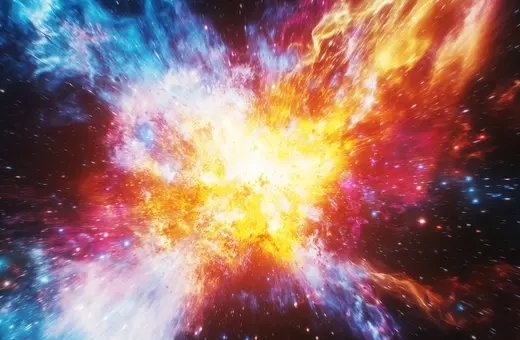We tend to think of the present moment as an infinitely small, discrete period of time; the present moment occurring just after the past, and just before the future. But, argues Emily Herring, this is a mistaken way to understand time. Time is not split into isolated, discrete present moments. Time is a flow, containing past, present and future all at once.
The following is adapted from Chapter 5 of Emily Herring’s upcoming book Herald of a Restless World: How Henri Bergson Brought Philosophy to the People (Basic Books 2024) released in the US October 22nd and in the UK October 24th.
Henri Bergson had spent his early childhood immersed in music, both his father’s compositions and the piano lessons he received from a young age. To his chagrin, he soon had to give up his musical education to focus on more serious subjects, but for the rest of his life he placed music among the highest arts. His many admirers often suggested that despite his incomplete musical training, he had remained a musician of a special kind.
In the early twentieth century, when crowds of hundreds, sometimes thousands, flocked to listen to Bergson lecture at the Collège de France, they left in a kind of trance, enchanted by the perfectly timed cadence of his speech, the melodic quality of his voice, and his masterful improvisations, which brought complex philosophical notions together in apparent harmony. The professor’s words seemed to flow effortlessly, almost as though he sang rather than spoke them. One of his admirers, Raïssa Maritain, recalled: “His eloquent and precise language held us in suspense; distraction was impossible. Our attention did not wander for an instant; nothing could break the precious thread of the discourse. It was like perfect and beautiful music.” In his written works as well, Bergson’s words resonated like musical instruments. The philosopher and poet André Joussain compared Bergson’s writing “to a symphony. . . . It has a flexibility that gives it an inexhaustible power of suggestion and seems to provide it with an almost undefined existence.”
 SUGGESTED READING
A Radical New Physics of Time
By Avshalom Elitzur
SUGGESTED READING
A Radical New Physics of Time
By Avshalom Elitzur
It was no accident that Bergson’s philosophy had a different ring to it. Through his research into the true nature of time and consciousness, music had taken on a meaning that went far beyond aesthetic pleasure. Listening to music, he found, was one of the human experiences that best illuminated real time, or as he called it, durée.
For Bergson, any time we represent time using static symbols or rigid concepts we produce a frozen, empty simulacra of temporality. This led to a kind of paradox: words mostly fall short, are not flexible enough to capture reality in all its fluidity, and therefore by definition, durée is almost impossible to define. And so when the American philosopher and intellectual historian Arthur O. Lovejoy wrote to him some years later to ask for clarification about his elusive yet central notion of durée, Bergson’s response was sympathetic: “The difficulties that you find in my description of durée no doubt stem from the fact that it is very difficult, if not impossible, to express in words something that goes against the very essence of language; I can merely attempt to suggest it.”





















Join the conversation